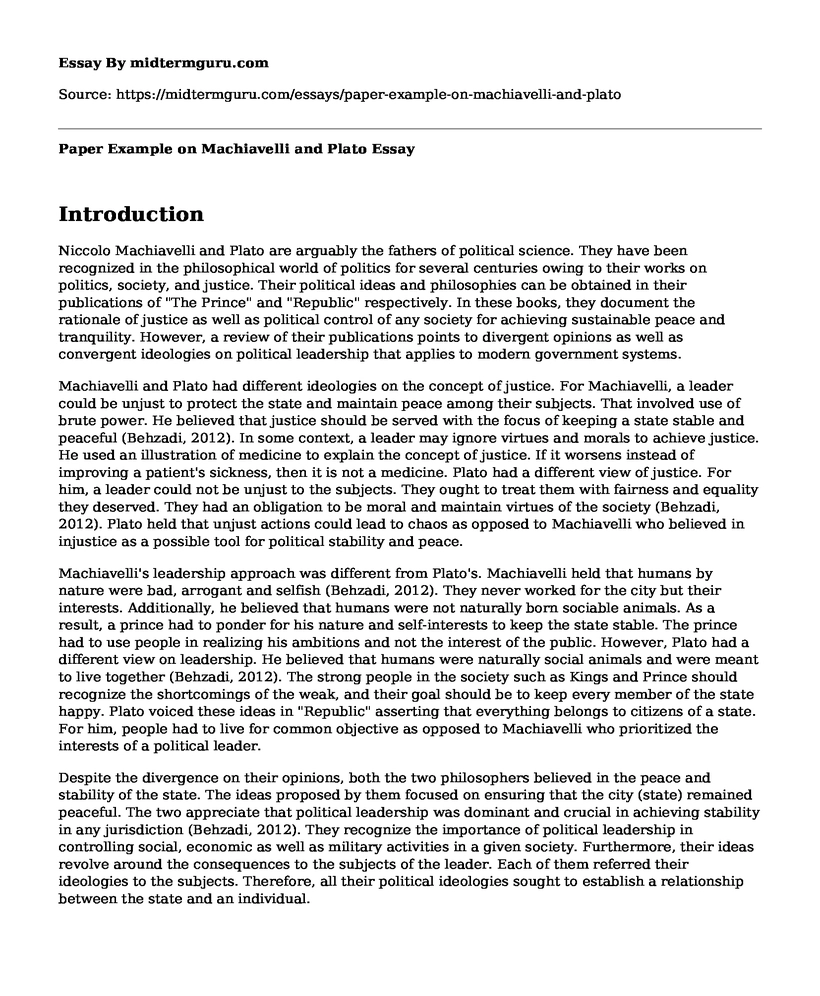Introduction
Niccolo Machiavelli and Plato are arguably the fathers of political science. They have been recognized in the philosophical world of politics for several centuries owing to their works on politics, society, and justice. Their political ideas and philosophies can be obtained in their publications of "The Prince" and "Republic" respectively. In these books, they document the rationale of justice as well as political control of any society for achieving sustainable peace and tranquility. However, a review of their publications points to divergent opinions as well as convergent ideologies on political leadership that applies to modern government systems.
Machiavelli and Plato had different ideologies on the concept of justice. For Machiavelli, a leader could be unjust to protect the state and maintain peace among their subjects. That involved use of brute power. He believed that justice should be served with the focus of keeping a state stable and peaceful (Behzadi, 2012). In some context, a leader may ignore virtues and morals to achieve justice. He used an illustration of medicine to explain the concept of justice. If it worsens instead of improving a patient's sickness, then it is not a medicine. Plato had a different view of justice. For him, a leader could not be unjust to the subjects. They ought to treat them with fairness and equality they deserved. They had an obligation to be moral and maintain virtues of the society (Behzadi, 2012). Plato held that unjust actions could lead to chaos as opposed to Machiavelli who believed in injustice as a possible tool for political stability and peace.
Machiavelli's leadership approach was different from Plato's. Machiavelli held that humans by nature were bad, arrogant and selfish (Behzadi, 2012). They never worked for the city but their interests. Additionally, he believed that humans were not naturally born sociable animals. As a result, a prince had to ponder for his nature and self-interests to keep the state stable. The prince had to use people in realizing his ambitions and not the interest of the public. However, Plato had a different view on leadership. He believed that humans were naturally social animals and were meant to live together (Behzadi, 2012). The strong people in the society such as Kings and Prince should recognize the shortcomings of the weak, and their goal should be to keep every member of the state happy. Plato voiced these ideas in "Republic" asserting that everything belongs to citizens of a state. For him, people had to live for common objective as opposed to Machiavelli who prioritized the interests of a political leader.
Despite the divergence on their opinions, both the two philosophers believed in the peace and stability of the state. The ideas proposed by them focused on ensuring that the city (state) remained peaceful. The two appreciate that political leadership was dominant and crucial in achieving stability in any jurisdiction (Behzadi, 2012). They recognize the importance of political leadership in controlling social, economic as well as military activities in a given society. Furthermore, their ideas revolve around the consequences to the subjects of the leader. Each of them referred their ideologies to the subjects. Therefore, all their political ideologies sought to establish a relationship between the state and an individual.
Conclusion
To sum up, Machiavelli believed in using available methods and power to achieve peace and stability. On the other hand, Plato believed in justice as an epitome of good political leadership and happiness in the society. However, the ideologies of the two established the relationship between a state and the individual. Despite, their differences and similarities, the ideologies are still relevant to political leadership and stability of states.
References
Behzadi, H. (2012). State and ruler In Plato and Machiavelli. Pakistan Horizon, 30(4), 15-22.
Cite this page
Paper Example on Machiavelli and Plato. (2022, Aug 18). Retrieved from https://midtermguru.com/essays/paper-example-on-machiavelli-and-plato
If you are the original author of this essay and no longer wish to have it published on the midtermguru.com website, please click below to request its removal:
- Questions on International Business Law and Its Environment: Regulating Trade
- Essay on Conflicts Between the Tibetans and the Han Chinese
- The Depiction of African Colonialism by Achebe and Conrad - Paper Example
- Abraham Lincoln Memorial: Honoring the 16th President - Research Paper
- Trump's Tax Reforms: Promises Fulfilled After 3 Decades - Essay Sample
- Reasons Behind English Colonization in 17th Century - Essay Sample
- Government Intervenes to Support Healthy, Safe Community for Kids - Essay Sample







